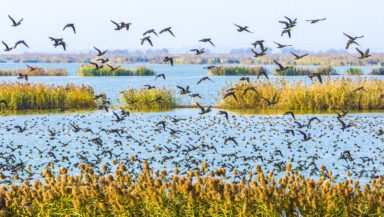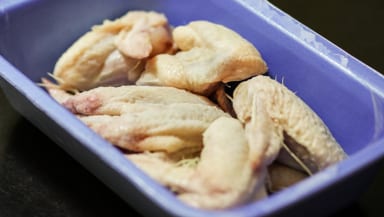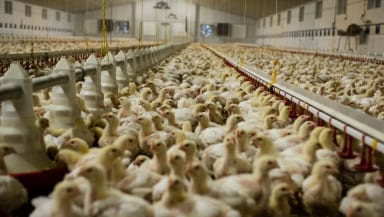At least 50 million hectares of forest – an area twice the size of the UK – is set to have been destroyed for commodities during 10 years of corporate commitments to end deforestation, according to a new Greenpeace International report [1].
The report, Countdown to Extinction, is published today as a thousand CEOs and senior managers of global brands gather in Vancouver for the Consumer Goods Forum (CGF) global summit. In 2010, CGF members – the world’s largest consumer brands, including Nestle, Mondelez and Unilever – promised to end deforestation by 2020 through “responsible sourcing” of cattle, palm oil, soya and other commodities. With just 200 days to go and their imminent failure to satisfy their commitments, forest protection and the climate crisis are not even on their agenda.
“These companies are destroying our children’s future by driving us towards climate and ecological collapse. They’ve wasted a decade on half-measures and in that time vast areas of the natural world have been destroyed. They should be in crisis talks right now, but they’re still trying to grow demand for products that will drive forest destruction even further,” said Anna Jones, Global Campaign Lead for Forests at Greenpeace UK.
Since 2010, production and consumption of agricultural commodities linked to deforestation – including cattle, soya, palm oil, rubber and cocoa – has increased dramatically and continues to rise [2]. 80 percent of global deforestation is a direct result of agricultural production [3], releasing climate emissions equivalent to Japan, Germany and the UK combined [4].
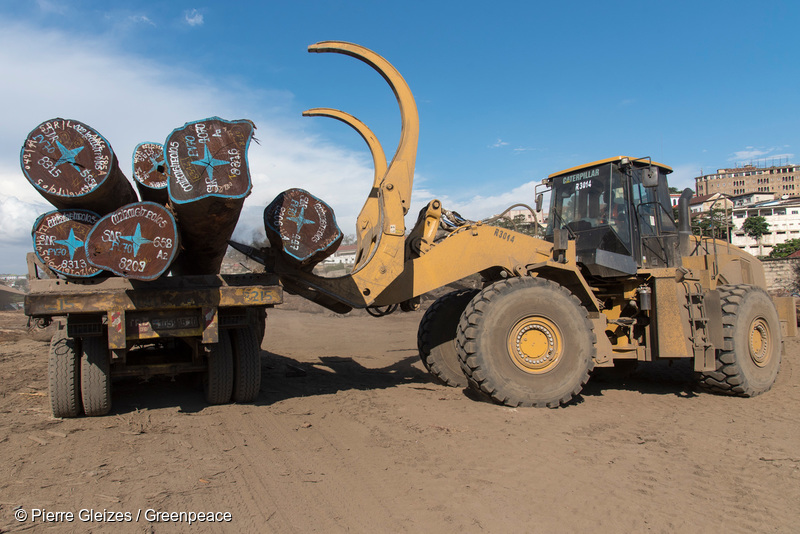
Industrial logging activity in the port of Matadi, Democratic Republic of the Congo. © Pierre Gleizes / Greenpeace
“In the Congo Basin, we are witnessing widespread environmental and human rights violations in the name of development and the global commodities trade. It’s all a kleptocracy where governments and companies collude to loot our natural resources and ordinary people pay the price,” said Victorine CheThoener, Head of the Congo Basin forests campaign at Greenpeace Africa.
In early 2019, Greenpeace wrote to more than 50 companies [5] asking them to demonstrate their progress towards ending deforestation by disclosing their commodity suppliers. Of the handful that did disclose the information, all source from traders or producers involved in forest destruction and no company was able to demonstrate meaningful effort to end links to deforestation.
All brands that disclosed suppliers were sourcing from commodities traders Bunge or Cargill, who buy soya from agribusinesses accused of land grabbing and destroying the Brazilian Cerrado, the world’s most wildlife-rich savannah. 90 percent of soya is used to feed animals to produce meat and dairy products. [6] Yet none of the companies Greenpeace contacted included animal feed in their deforestation reporting. They couldn’t provide details on how much soya they were using for animal feed, let alone where it was sourced from.
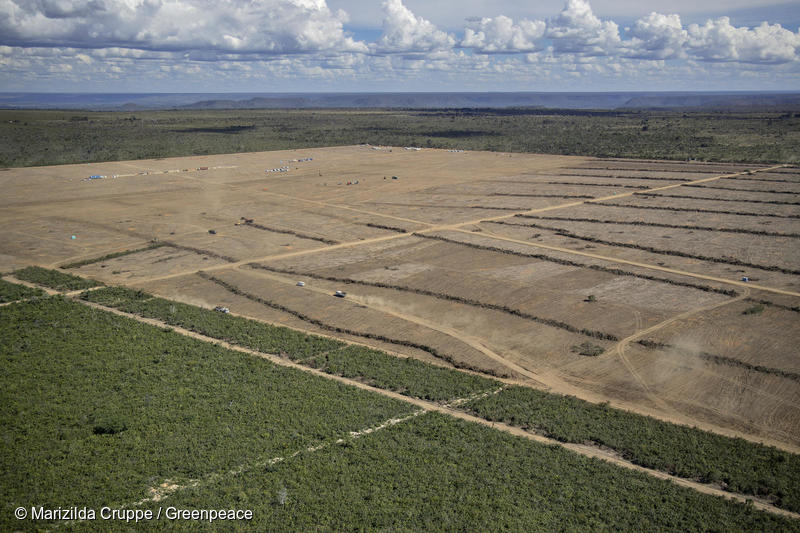
Deforested area in the municipality of Barreiras, the Cerrado region in the western of Bahia, Brazil. This area is known as the “Ring of Soy” as it brings together several farms, processors and soybean distribution centers. © Marizilda Cruppe / Greenpeace
“While global attention has been focused on the Amazon, the soya and cattle industries have been trashing the Cerrado – destroying the local environment, aggravating the climate crisis, and displacing and committing violence against Indigenous and traditional populations that have occupied the territory for hundreds of years. Global brands must bring their suppliers under control,” said Romulo Batista, Forests Campaigner at Greenpeace Brazil.
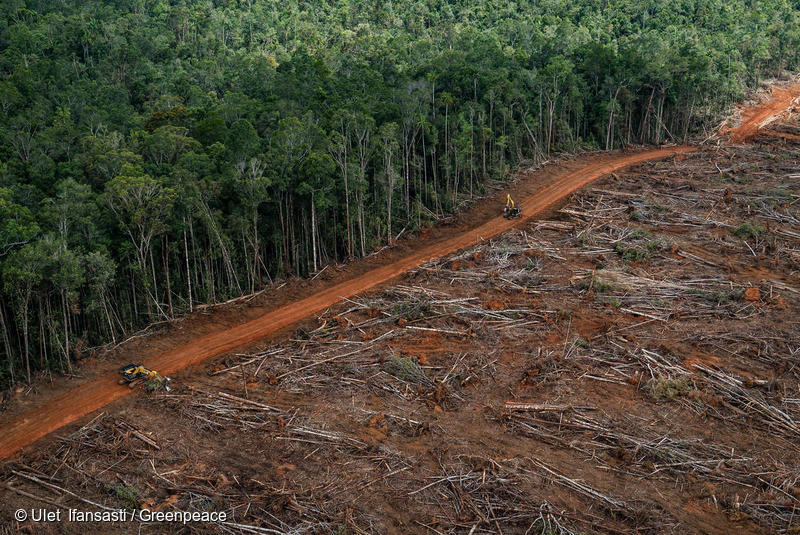
Documentation of landcover, forest clearance and plantation development in PT Megakarya Jaya Raya oil palm concession, Papua, Indonesia. © Ulet Ifansasti / Greenpeace
Following Greenpeace pressure on the palm oil industry last year, Wilmar International, the world’s largest palm oil trader, committed to map and satellite monitor all of its suppliers. But this move has been ignored by other leading palm oil traders like Cargill, GAR and Musim Mas. Last month, the Indonesian government made matters even worse by ordering that no palm oil company publish data regarding its concessions.
“The Indonesian government’s move stands to cause untold damage to the economy. Consumer brands would be unable to prove that the palm oil they’re buying is deforestation-free and would have no choice but to stop buying palm oil altogether,” said Kiki Taufik, Head of the Indonesian forests campaign at Greenpeace Indonesia
The recent IPCC and IPBES reports contain the most urgent warnings yet from the world’s top scientists on the need for radical reform of the agricultural industry and food system, including a shift from meat-rich to healthy plant-based diets, to prevent climate and ecological breakdown.
“Our message to companies is simple: evolve your business to prevent climate and ecological breakdown. The only alternative is to start winding down,” said Anna Jones.
ENDS
Report download: www.greenpeace.org/extinction
Photos: https://media.greenpeace.org/Share/7n266014r2f54n7yvcor71ec6kox242h
– Click on an image to enlarge
– Click download arrow underneath image and choose size (up to 2500 pixels)
Please credit the photographer and Greenpeace.
Notes to editors:
[1] 50 million hectares is a conservative estimate based on a combination of actual data on deforestation from 2010-15, tree cover loss from 2010-18 and forecasting until the end of 2019. From 2010-15 deforestation and tree cover loss combined was approximately 5 million hectares per year – according to scientific analysis of satellite mapping from NASA. If this rate continued, forest loss would reach 50 million hectares by the end of 2019. However, because tree cover loss has increased in the years 2016-18, it’s likely deforestation will also have increased, so the actual figure could be much higher.
[2] Since 2010, the area planted with soya in Brazil has increased by 45%, Indonesian palm oil production is up 75% and Côte d’Ivoire’s cocoa footprint has grown by 80%. Worse is to come: by 2050, global meat consumption (and hence production) is also forecast to rise by 76%, soya production by nearly 45% and palm oil production by nearly 60%.
[3] Kissinger G, Herold M & De Sy V (2012) ‘Drivers of deforestation and forest degradation: A synthesis report for REDD+ policymakers’ p11
[4] Annual net emissions from deforestation for agriculture and tree plantations in tropical countries alone averaged 2.6GtCO2. Pendrill F et al (2019) ‘Agricultural and forestry trade drives large share of tropical deforestation emissions’ Global Environmental Change 56: 1–10.
This is equivalent to the combined total emissions of Japan, Germany and the UK. CAIT Climate Data Explorer.
[5] Companies written to include:
Consumer goods companies, such as Unilever, Mars, Nestle, Mondelez, Procter & Gamble, Kellogg, Danone
Retailers: Walmart, Tesco, Carrefour, Casino, Metro, Ahold Delhaize
Fast food companies: McDonald’s, Yum! brands (KFC), Burger King, Subway
Meat producers: Tyson, Danepak, JBS, Marfrig, Danish Crown
Dairy companies: Arla, Dairy Crest, FrieslandCampina
Commodities traders: Cargill, ADM, Bunge, Wilmar, Louis Dreyfus
[6] Sharma S, IATP & Schlesinger S (2017) ‘The rise of big meat: Brazil’s extractive industry’ p25
Contacts:
Alison Kirkman, Greenpeace UK, London +44 (0) 20 7865 8255 or +44 (0) 7896 893154 (BST), alison.kirkman@greenpeace.org

